|
|
|
Sort Order |
|
|
|
Items / Page
|
|
|
|
|
|
|
| Srl | Item |
| 1 |
ID:
168415
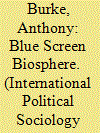

|
|
|
|
|
| Summary/Abstract |
From the social contract theory of Hobbes and Locke to the United Nations Charter, the sovereign state has formed the fulcrum of political order and law. Yet in the Anthropocene, this humanist political containment fails to grapple with humanity's dangerous enmeshment with the ecological systems of planet Earth. This article addresses one aspect of this dilemma by focusing on the international law and governance of biodiversity, which presents a “blue screen” biosphere: a material simulation that enables a double disappearance of biodiversity from the text of international law and from the actuality of the world. Through a critique of the figure of the “natural resource,” the article finds that the founding texts of international environmental law entrench a twofold humanism-as-statism that simultaneously supports the geopower of the state to facilitate the capitalist appropriation of the nonhuman and imports the modern metaphysics of the human domination of nature into international customary law. Such legal-political ontologies block a path to a more hopeful system of global ecological law and governance based on the “rights of nature” that might be able to honor the intrinsic value of the biosphere as a rich, agentic, and communicative whole, fundamental to the Earth's survival.
|
|
|
|
|
|
|
|
|
|
|
|
|
|
|
|
| 2 |
ID:
181525
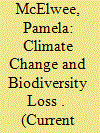

|
|
|
|
|
| Summary/Abstract |
While often treated separately, biodiversity loss and climate change are related and mutually reinforcing problems. Rising temperatures and other climate impacts have seriously altered the composition, function, and structure of many ecosystems and species, some irreversibly. Policies to tackle both problems are clearly needed, but siloed approaches continue to dominate proposed solutions. There are also risks that some climate policies, such as the expansion of afforestation or bioenergy, will have increasingly negative risks on biodiversity. Integrated, innovative, and urgent solutions are needed in order to fulfill increasing calls for transformative change in how we live with nature.
|
|
|
|
|
|
|
|
|
|
|
|
|
|
|
|
| 3 |
ID:
141252
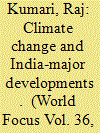

|
|
|
|
|
| Summary/Abstract |
Climate change is one of the main environmental challenges facing the world today. India is facing several problems. Climate change is associated with various adverse impacts on agriculture, water resources, forest and biodiversity, health, coastal management and increase in temperature Climate change would represent additional stress on the ecological and socioeconomic systems that are already facing tremendous pressure due to rapid industrialization, urbanization and economic development. This paper analyzes the efforts made by government of India to reduce the environmental challenges.
|
|
|
|
|
|
|
|
|
|
|
|
|
|
|
|
| 4 |
ID:
141251
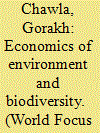

|
|
|
|
|
| Summary/Abstract |
A nation’s prosperity depends on its competitiveness, which is based on the productivity with which it produces goods and services. Economists and biodiversity conservationists tend to agree on one central point regarding the relationship between the economy and biodiversity, that the damage to biodiversity increases dramatically in the course of economic development until, at a certain level of wealth, opportunities for biodiversity conservation can potentially be improved. There is also strong agreement about the central importance of development for the eradication of poverty. Among its many other terrible effects, poverty is one of the major contributors to stress on biodiversity. Economists emphasize the contribution of economic growth to providing the resources needed for biodiversity conservation, improving access to environment friendly technologies, and, with increases in standard of living, providing the flexibility societies need to make biodiversity and development trade-offs more favorable to biodiversity conservation.
|
|
|
|
|
|
|
|
|
|
|
|
|
|
|
|
| 5 |
ID:
113982
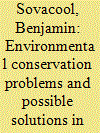

|
|
|
|
|
| Publication |
2012.
|
| Summary/Abstract |
This article explores what the academic literature tells us about environmental conservation challenges in Myanmar, and what types of domestic and international mechanisms are suited to address those challenges. It begins by providing background information on rural energy use, environmental legislation, forestry, agriculture and the country's network of protected areas. It notes, for example, that the country's protected areas face environmental degradation caused by poverty, corruption, the expansion of agricultural land and population growth. It goes on to argue that planners in Myanmar can, however, utilize a variety of mechanisms to overcome these challenges. Policy-makers can enhance community involvement in protected areas and management schemes through ownership and engagement. They could integrate conservation efforts with income generation, provide education and awareness campaigns for those living near wildlife areas and expand the number and size of protected areas. They could, furthermore, increase penalties against illegal activities within protected areas, offer accelerated staff training and education programmes and similarly consolidate regulatory authority for environmental conservation. Even those outside of Myanmar can prevent environmental destruction. International planners could implement ecosystem payments schemes, involve Myanmar more concretely in the Reducing Emissions from Deforestation and Degradation (REDD) process, an international agreement launched in 2012, and expand Myanmar's participation in [End Page 217] the Convention on International Trade in Endangered Species of Wild Fauna and Flora. Lastly, they could advocate international bans on exports of illegal products and strengthen capacity building efforts in the areas of forestry, land use and agriculture.
|
|
|
|
|
|
|
|
|
|
|
|
|
|
|
|
| 6 |
ID:
112475
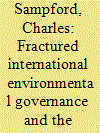

|
|
|
|
|
| Publication |
2012.
|
| Summary/Abstract |
This paper begins by examining the reasons behind most failures of governance, including fault lines in institutional and professional specialisation, and in ideology. These three, forever competing within and between themselves, frustrate attempts to find solutions to some of the world's most pressing challenges. Not least among these are environmental challenges, where preferences and priorities that are geographically, professionally or ideologically narrow inevitably fail to achieve solutions for the greater good. What role can the Commonwealth play in addressing the fracture lines that bedevil solutions for climate change and biodiversity? It may help to stimulate global action on these issues if it can encourage agreement across multidimensional global boundaries. We know the Commonwealth is not a leading global force for controlling climate change or biodiversity loss; but if it had the political will it could be an exemplar of how, between a group of vastly diverse countries across the globe-and on the global political stage-binding agreement and positive action on climate change and biodiversity could be promoted and perhaps achieved. One of the strongest features of the Commonwealth is the generation of long-standing legal and ethical norms whose appeal is obvious even if their implementation is lacking. These norms should not be limited to the rule of law, democracy and human rights, but should include environmental norms because these too are fundamental to a satisfactory human condition.
|
|
|
|
|
|
|
|
|
|
|
|
|
|
|
|
| 7 |
ID:
094487
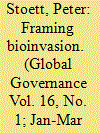

|
|
|
|
|
| Publication |
2010.
|
| Summary/Abstract |
This article introduces the complexities of framing the policy debate over invasive alien species or, more generally, bioinvasion. It suggests that there are six principal framing conceptualizations that have emerged or are gaining steam and credence: biodiversity and conservation; climate change and globalization; human security; "natural national security"; market failure; and the commons and global governance. Although the biodiversity approach dominates the international discourse at present, it presents a partial and hence distorting picture. Over time, as the problem of bioinvasion compounds, the inadequacy of the biodiversity frame will become generally apparent and so the other framings will gain in currency. Ultimately, bioinvasion must be viewed as a policy challenge for global environmental governance and justice. The author concludes by raising the limited possibility of developing an International Convention on Invasive Alien Species.
|
|
|
|
|
|
|
|
|
|
|
|
|
|
|
|
| 8 |
ID:
129199


|
|
|
|
|
| Publication |
2014.
|
| Summary/Abstract |
Imagine subsistence hunters in Brazil, or farmers in the Andean highlands, or fishing communities in Cambodia. Each of these geographically disparate groups is among the indigenous peoples of the world whose livelihoods, cultures, and identities are intimately tied to the land on which they have lived for generations. However, they do not only share this tie to their traditional land. Indigenous peoples' rights to their land, territories, and natural resources have often been historically ignored or neglected when large-scale development or conservation activities, such as hydropower dams or protected areas, were being planned and implemented.
Conservation and development activities have the potential to negatively or positively impact the rights of indigenous peoples, both at very small or very large scales. Notably, data from the Global Environment Facility (GEF) shows that land under the management of indigenous peoples only makes up 20% of the world's landmass and yet it holds roughly 80% of the Earth's remaining biodiversity. This biodiversity and related traditional knowledge, which has been maintained, used, catalogued, and respected for thousands of years by many indigenous peoples, has the potential to maintain cultures, help agricultural systems adapt to a changing climate, offer medical solutions, and inspire awe. However, anything this traditional knowledge may offer the rest of the world, including the biodiversity it has maintained, must be provided with the consent of the indigenous peoples to which it belongs.
|
|
|
|
|
|
|
|
|
|
|
|
|
|
|
|
| 9 |
ID:
107033
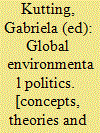

|
|
|
|
|
| Publication |
London, Routledge, 2011.
|
| Description |
x, 198p.
|
| Series |
Global environmental politics
|
| Standard Number |
9780415777933, hbk
|
|
|
|
|
|
|
|
|
|
|
|
Copies: C:1/I:0,R:0,Q:0
Circulation
| Accession# | Call# | Current Location | Status | Policy | Location |
| 056191 | 363.70526/KUT 056191 | Main | On Shelf | General | |
|
|
|
|
| 10 |
ID:
190953


|
|
|
|
|
| Summary/Abstract |
One of the epic national narratives of modernization and development in China is the story of Beidahuang (‘Great Northern Wilderness’) in the country’s northeast. The term ‘Beidahuang’ refers originally to state-sponsored campaigns, starting in the 1950s, that involved the enlistment of tens of thousands of People’s Liberation Army soldiers, educated youth, and Communist Party cadres. Their task was to transform the vast northeast ‘wasteland’ into productive farmland that would feed the nation while securing the nation’s borders with Russia. This article examines the significance of Beidahuang as a feature of the environmental discourse in China’s northeast borderlands, focusing on the first decade of the twenty-first century when the Chinese state was establishing more systematic measures for addressing environmental concerns. In the context of the northeast borderland, the massive deforestation that resulted from the socialist campaigns to transform ‘wasteland’ into productive farmland has left a controversial legacy for regional elites grappling with the Party leadership’s turn towards environmental conservation as an emerging political priority. This article suggests that the ongoing importance of the ‘Great Northern Wilderness’ in the Chinese cultural imagination has shaped the ways in which regional elites frame environmental issues in relation to economic development, nationalism, and border relations with Russia.
|
|
|
|
|
|
|
|
|
|
|
|
|
|
|
|
| 11 |
ID:
117946


|
|
|
|
|
| Publication |
2013.
|
| Summary/Abstract |
This article argues that institutional interactions that cut across the domains of trade and environment are embedded in overarching norms that shape their evolution and impact. In making this argument, it analyzes three cases of such interactions within the climate change and biosafety regime complexes: those relating to trade-related climate policies and measures, forest carbon sinks, and trade in genetically modified organisms. The analysis highlights the dominance of liberal environmentalism (a set of global norms promoting economic efficiency and environmental improvements through market-based mechanisms) in shaping institutional interactions within these regime complexes, even as liberal environmentalism is contested by key actors. This, in turn, has implications for effective management of institutional interlinkages within regime complexes in global environmental governance.
|
|
|
|
|
|
|
|
|
|
|
|
|
|
|
|
| 12 |
ID:
105131
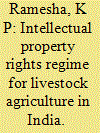

|
|
|
|
|
| Publication |
2011.
|
| Summary/Abstract |
In order to protect the interest of all stake holders of livestock farming in India, it is necessary to protect innovations in livestock sector through appropriate IP instruments along with conservation and sustainable use of native livestock breeds and associated traditional knowledge through sui generis system in the modern IPR regime. The unique attributes of indigenous livestock breeds could be exploited for profits by getting some form of intellectual property rights (IPR) or protection. An appropriate internationally accepted legal system with respect to use of livestock biodiversity and patenting of novel genes may bring about economic benefit to the livestock keepers in the IPR regime through benefit sharing. Harmonization of IP regimes, access to technologies required for biotechnological research and development through easy licensing and/or patent exemptions especially for public benefit oriented research would pave way for making private investments and private-public participation attractive. Present status of IPR protection in livestock sector in India and future prospects considering the typical livestock production situation existing in the country are analysed.
|
|
|
|
|
|
|
|
|
|
|
|
|
|
|
|
| 13 |
ID:
166141
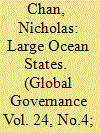

|
|
|
|
|
| Summary/Abstract |
Small island states are typically portrayed as vulnerable and insignificant actors in international affairs. This article traces the emerging self-identification of “large ocean states” that these small island states in the Pacific and Indian Oceans are now employing, juxtaposing their miniscule landmass and populations with the possession of sovereign authority over large swathes of the world’s oceans. Such authority is increasingly being exercised in the context of biodiversity conservation through expanding marine protected areas (an element of both the Sustainable Development Goals and the Aichi Targets of the Convention on Biological Diversity) as an expression of “ecological responsibility.” This new exercise of green sovereignty reinforces state control over spaces previously governed only at a distance, but control made possible only through compromises with nonstate actors to fund, monitor, and govern these MPAs.
|
|
|
|
|
|
|
|
|
|
|
|
|
|
|
|
| 14 |
ID:
147475


|
|
|
|
|
| Publication |
Noida, HarperCollins Publishers, 2015.
|
| Description |
xiii, 280p.pbk
|
| Standard Number |
9789351770640
|
|
|
|
|
|
|
|
|
|
|
|
Copies: C:1/I:0,R:0,Q:0
Circulation
| Accession# | Call# | Current Location | Status | Policy | Location |
| 058809 | 304.2/SON 058809 | Main | On Shelf | General | |
|
|
|
|
| 15 |
ID:
157405
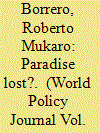

|
|
|
|
|
| Summary/Abstract |
With their striking flora and fauna and consistently pleasant temperatures, it’s no wonder that the Caribbean islands are often described as paradise. Across the region, ecosystems ranging from high-elevation cloud forests to cactus scrublands boast an incredible array of plants and animals. The Caribbean is also designated as a biodiversity hotspot, which means that its rich natural resources are under threat of destruction. About 70 percent of its original habitats have been lost to natural processes such as water and wind erosion, as well as human activities like deforestation, chemical dumping, and construction. Rising sea levels are another looming menace.
|
|
|
|
|
|
|
|
|
|
|
|
|
|
|
|
| 16 |
ID:
133551
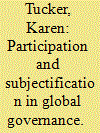

|
|
|
|
|
| Publication |
2014.
|
| Summary/Abstract |
In this article, I examine the ways in which NGO participation in global governance both relies on and produces particular forms of NGO subjectivity. Focusing on NGO interaction with WTO policy-makers in relation to ongoing policy debates about trade, intellectual property law and the protection of 'traditional knowledge' and 'biodiversity', I explore the ways in which particular forms of subjectivity are elicited and rewarded from (would-be) NGO participants in dialogue, consultation and information-sharing with the WTO. I also consider the forms of NGO subjectivity that are treated as normal, credible and acceptable in this field of global governance, and those that are constructed as undesirable and unacceptable. In doing so, I illustrate some of the forms of inclusion and exclusion that underpin the contributions that NGOs make to policy-making on traditional knowledge and biodiversity in the WTO, disrupting and complicating ideas about the qualities that NGOs bring to global governance.
|
|
|
|
|
|
|
|
|
|
|
|
|
|
|
|
| 17 |
ID:
133287
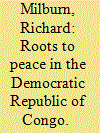

|
|
|
|
|
| Publication |
2014.
|
| Summary/Abstract |
The Democratic Republic of Congo (DRC) is endowed with an abundance of natural resources, and the presence of high-value resources such as coltan and diamonds is well known. The country is also endowed with a wealth of biodiversity, although the value of this is often overlooked. This article describes the detrimental impact of armed conflict on this biodiversity and the dangers posed by the return of peace, which is likely to result in increased biodiversity exploitation. The resulting loss of key carbon sinks crucial to the global fight against climate change will affect not only the DRC, but also the international community. Biodiversity is therefore identified as a threat to security but also a valuable asset for development, and this article discusses methods to realize the value of biodiversity in the DRC through the benefits of ecosystem services and income generated from monetizing biodiversity. It concludes by arguing that the false dichotomy of conservation and development as separate entities and objectives needs to change so that conservation becomes a central pillar of security and development work in the DRC and other regions of current or recent armed conflict around the world.
|
|
|
|
|
|
|
|
|
|
|
|
|
|
|
|
| 18 |
ID:
139304
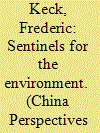

|
|
|
|
|
| Summary/Abstract |
This article compares the modes of organisation and engagement of birdwatching societies in Taiwan and Hong Kong. Tracing their origins to American, Japanese, and British models of nature conservation, it shows the growing involvement of Chinese citizens in the observation and protection of birds. Asking how birds can be used as “flagship species” to hold together environmental movements in a sustainable and constructive way, the article proposes the concept of “sentinel” to capture the mix of democratic environmental concern and a military model of territory mapping.
|
|
|
|
|
|
|
|
|
|
|
|
|
|
|
|
| 19 |
ID:
120944
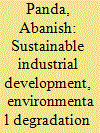

|
|
|
| 20 |
ID:
163587
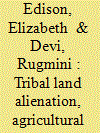

|
|
|
|
|
| Summary/Abstract |
This article, based on fieldwork, discusses the negative impacts of land alienation suffered by Adivasis in Attappady, a tribal block of Kerala in South India. Experiencing multiple alienations that have fundamentally affected their way of life, agricultural practices and food culture, tribals not only continue to suffer discriminatory treatment by non-tribal settlers, but also by state authorities’ restrictions of access to local forests and forest produce. These problems assume added significance as this ecologically important location in the Western Ghats of India is one of the eight ‘hottest hotspots’ of biological diversity in the world, while the traditional guardians of this environment have been completely disempowered. The article traces abuses of power in land alienation processes, analyses unequal power structures and argues that better appreciation of traditional tribal culture and its ecologically holistic approaches ought to inform policies for local sustainable development. This would help the tribals to safeguard their identity within the constraints of current conditions and enhance the prospects for sustainable preservation of the precious local natural resources and biodiversity.
|
|
|
|
|
|
|
|
|
|
|
|
|
|
|
|
|
|
|
|
|